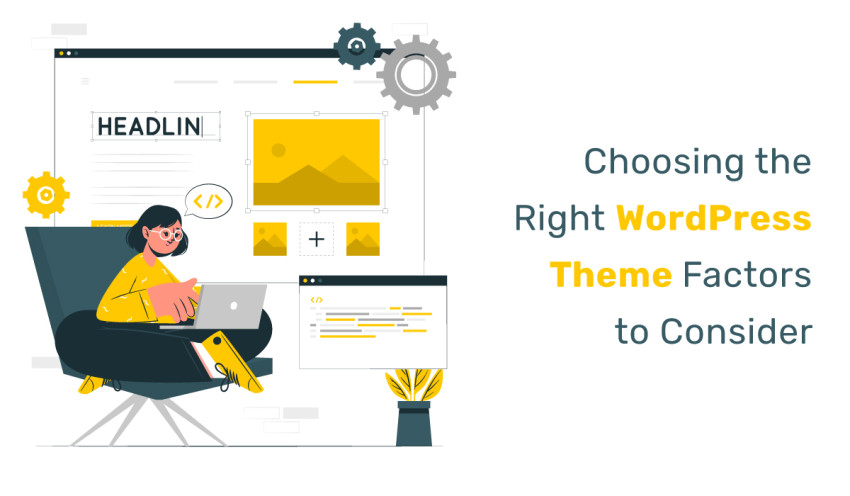
Creating a visually appealing and functional website is essential for any online presence, and WordPress is undeniably one of the most popular platforms for website building. With a wide array of themes available, selecting the right WordPress theme can be overwhelming. Your website's theme lays the foundation for its design and functionality, so it's crucial to choose wisely. In this blog post, we'll explore the key factors to consider when choosing the perfect WordPress theme for your website.
Purpose and Content:
Before delving into theme options, determine the purpose of your website and the type of content you'll be showcasing. Whether it's a personal blog, business website, portfolio, e-commerce site, or an online magazine, each requires a different approach in terms of design and features. Ensure the theme you choose aligns with your website's objectives and facilitates the presentation of your content effectively.
Responsive Design:
In today's mobile-first era, responsiveness is paramount. A responsive theme adjusts seamlessly to different screen sizes and devices, offering an optimal user experience across desktops, tablets, and smartphones. With an increasing number of users accessing websites on mobile devices, a non-responsive theme could result in higher bounce rates and negatively impact your site's search engine rankings.
Customization Options:
Flexibility is a key factor when selecting a WordPress theme. Look for themes that provide extensive customization options, allowing you to tweak colors, fonts, layouts, and other design elements to match your brand identity. Themes with a built-in theme customizer or integration with popular page builders like Elementor or Beaver Builder can make the customization process easier and more enjoyable.
Loading Speed:
Website loading speed plays a critical role in user satisfaction and search engine rankings. Studies have shown that users tend to abandon sites that take too long to load. Choose a theme that is optimized for speed and performance to ensure smooth browsing for your visitors. Lightweight themes with minimal coding and efficient design can significantly impact your site's loading times.
Compatibility with Plugins:
Plugins add additional functionality to your website, and you'll likely use several of them to enhance its features. Before settling on a theme, verify its compatibility with popular plugins you plan to use, such as SEO plugins, contact forms, security plugins, and social media integration. A theme that plays well with essential plugins will save you from compatibility issues down the road.
Support and Updates:
Opt for themes that receive regular updates and are backed by a reputable development team. Regular updates ensure that your theme remains compatible with the latest WordPress version and provides improved security and performance. Additionally, themes with reliable customer support are invaluable in case you encounter any issues or need assistance during the setup and customization process.
SEO Friendliness:
A well-coded and SEO-friendly theme can significantly boost your website's chances of ranking higher in search engine results. Themes that adhere to SEO best practices, such as proper HTML structure, schema markup, and optimized meta tags, can contribute to improved organic traffic and better overall search visibility.
Browser Compatibility:
Your website will be accessed through various web browsers, each with its quirks and rendering capabilities. Choose a theme that is compatible with major browsers like Chrome, Firefox, Safari, and Edge to ensure consistent and reliable display across different platforms.
Demo and Documentation:
Demo content allows you to see how the theme looks and functions before making a final decision. Many premium themes provide a demo website to explore their features thoroughly. Additionally, comprehensive documentation can be immensely helpful in understanding the theme's setup, configuration, and customization processes.
User Reviews and Ratings:
When selecting a theme, take into account the experiences of other users. Read reviews and ratings from those who have used the theme to gain insights into its pros and cons. Popular marketplaces like ThemeForest and the WordPress.org theme repository offer user reviews and ratings to guide your decision-making process, suggest some WordPress designers in Toronto.
Conclusion:
Selecting the right WordPress theme for your website is a crucial step in building a successful online presence. By considering factors such as purpose, responsiveness, customization options, loading speed, plugin compatibility, support, SEO-friendliness, browser compatibility, demo and documentation, and user reviews, you can make an informed decision that aligns with your website's goals and resonates with your audience. Remember, a well-chosen theme not only enhances your website's appearance but also provides a seamless user experience, contributing to the growth and success of your online venture.


